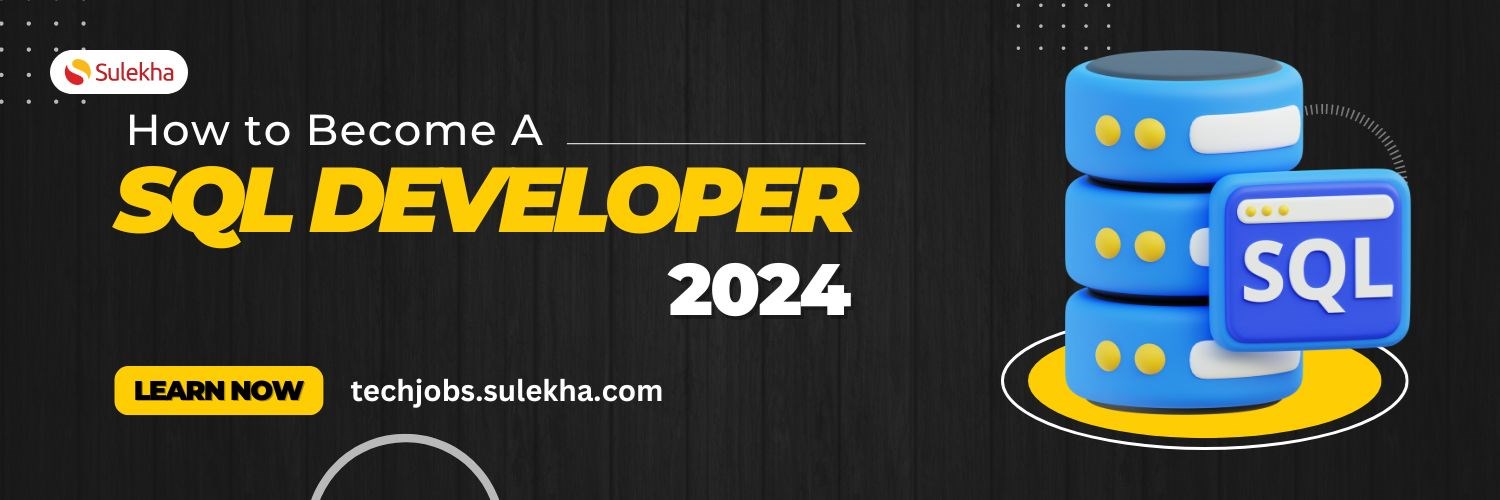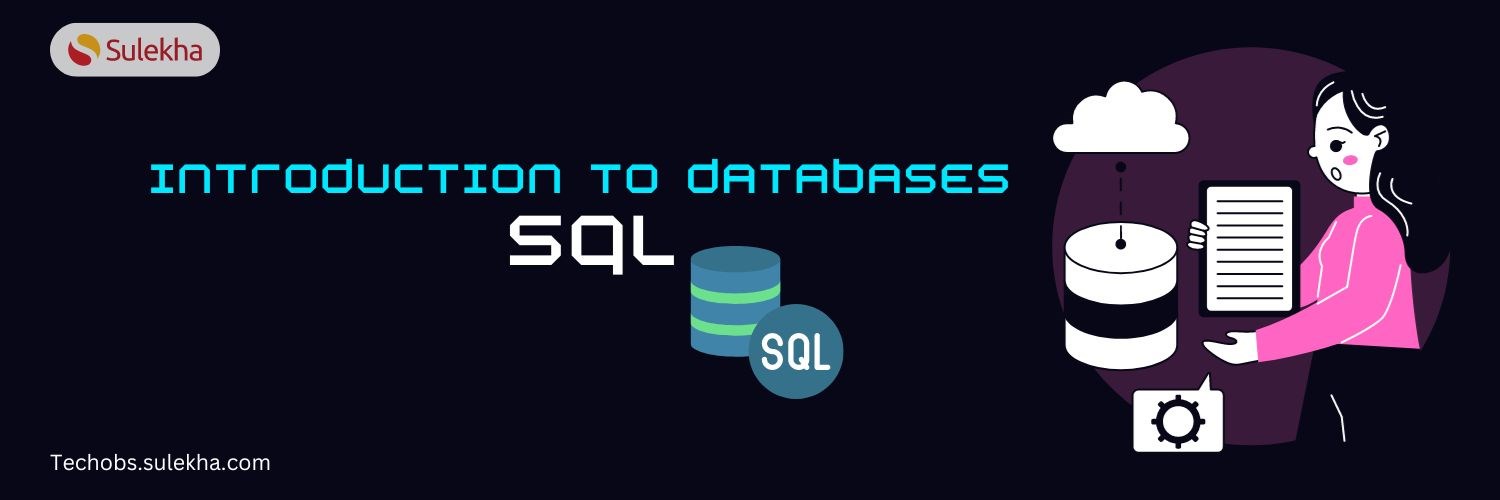How to Become an SQL Developer?

How to Become an SQL Developer?
The increasing reliance on data management across various sectors, such as technology, healthcare, and retail, drives the demand for SQL developers. The role of an SQL developer offers significant scope for career growth, with progression from junior to senior positions showcasing the potential for increased responsibilities and strategic roles within the data management ladder.
Businesses continually seek skilled data professionals to manage databases efficiently, making SQL developers essential for ensuring data integrity and accessibility. The dynamic nature of the data landscape led SQL developers to continually adapt to the new database technologies, data management practices, and industry trends. This perpetual learning and skill refinement make SQL developers valuable assets in the industry.
What is the growth of SQL developers?
The U.S. Bureau of Labor Statistics projects a 25% job growth rate for software developers, including SQL developers, between 2021 and 2031. This is much faster than the average for all occupations. Zippia's data analysis shows that SQL server developers' projected job growth rate is 21% from 2018-2028, with about 284,100 new jobs projected over the next decade.
The job outlook of SQL developer
According to Salary.com, the average SQL Developer salary in the United States is $147,183 as of March 26, 2024, with a typical range between $133,580 and $161,881. Indeed reports an average salary of $90,572 annually for SQL Developers in the United States.
What is an SQL Developer?
An SQL Developer is a versatile professional who plays a crucial role in database management and software development. These individuals are skilled in using Structured Query Language (SQL) to manipulate data, implement database-driven solutions, and build applications. SQL developers design relational databases, write code to interact with stored data and ensure databases meet functional requirements. Their responsibilities include:
· Optimizing database performance.
· Creating complex functions and stored procedures.
· Analyzing queries.
· Developing security protocols.
· Resolving issues.
· Designing database architecture.
· Creating dashboards.
On the other hand, SQL developer also work closely with business analysts, IT professionals, and database administrators to help companies manage databases and data manipulation.
What does an SQL developer do?
SQL developers prominently develop and manage SQL databases. Database management includes planning, maintaining, and developing databases. Developers manipulate data by performing CRUD (create, read, update, delete) operations on database tables. SQL developers utilize structured query language (SQL) to generate and alter database tables by implementing CRUD SQL commands.
How to become a SQL developer
Step 1: Earn a degree
Common degrees for SQL developers include a bachelor's degree in computer information systems or a related field. A computer science or information technology degree can equip you with the necessary skills and knowledge to excel as an SQL developer. These subjects include computer algorithms, database management, and programming languages.
Step 2: Join certification course
SQL certification provides a standardized measure of your SQL proficiency, showcasing your commitment to continuous learning and increases your earning potential in the tech industry, making it a valuable investment in your professional growth and development
If you are looking for the best SQL course providers, Sulekha offers a range of options for training and certification from top trainers. By approaching Sulekha, you can access hands-on practice, in-class seminars, and certification courses to enhance your SQL skills and knowledge. Sulekha's platform connects you with world-class trainers, providing a comprehensive learning experience tailored to your needs and ensuring you receive quality training in SQL.
Top certification courses to become a SQL developer includes:
Microsoft Certified Systems Engineer: Data Management and Analytics
Oracle PL/SQL Developer Certified Associate
Microsoft Certified Professional Developer (MCPD)
Azure Data Fundamentals
Oracle Database SQL Certified Associate Certification
Step 3: Gain skills
To become a SQL developer, you should start gaining MySQL, Microsoft SQL Server, and PostgreSQL.
Learn SQL: This is the core. Grasp core SQL concepts like data types, querying data (DQL), manipulating data (DML), defining tables (DDL), and more. To become a SQL developer, you should start gaining MySQL, Microsoft SQL Server, and PostgreSQL.
Databases: Understand relational databases, their structure, and how SQL interacts with them. Explore popular systems like MySQL, PostgreSQL, and Microsoft SQL Server.
Step 4: Gain experience
After completing the SQL certification course, you can start looking for a job and can obtain opportunities to get placed in top companies like:
1. Tata Consultancy Services
2. Cognizant Technology Solutions
3. Wells Fargo
4. Deloitte
5. JPMorgan Chase
6. CCS Global Tech
Step 5: Keep Learning
The data landscape keeps evolving. Stay up-to-date with new trends and technologies, such as cloud databases (e.g., Amazon Redshift) and big data processing tools.
Responsibility of SQL developer
· SQL developers are responsible for designing databases and ensuring their stability, reliability, and performance. This involves creating tables, stored procedures, views, and functions to meet organizational needs.
· SQL developers must review and interpret business report requirements, analyze existing SQL queries for performance improvements, and suggest new queries to enhance data retrieval efficiency.
· SQL developers play a crucial role in data management by researching required data, building reporting deliverables, developing procedures for data migration, and providing timely management reporting.
· SQL developers need to write efficient SQL queries to retrieve, manipulate, and manage data effectively.
· They are responsible for optimizing queries, indexes, and database structures to improve performance and scalability.
· SQL developers must possess strong interpersonal and communication skills to work effectively in teams, collaborate with colleagues across IT departments, and interact with third-party vendors and business units to address data needs and enhance business intelligence.
Overall, SQL developers play a crucial role in designing, implementing, and maintaining databases that support the storage and retrieval of data for applications and businesses. To fulfill their responsibilities effectively, they require a strong understanding of SQL, database principles, and best practices.
Skills required to become an SQL developer
SQL Proficiency
You should be well-versed in writing SQL queries to extract, manipulate, and analyze data. This includes understanding concepts like SELECT statements, aggregate functions, joins, subqueries, and window functions.
Database Management Systems (DBMS)
SQL works alongside database management systems. So, familiarity with popular ones like MySQL, Microsoft SQL Server, and PostgreSQL is crucial.
Make sure you have a solid understanding of core SQL concepts like data types, DDL (Data Definition Language) statements for creating and altering tables, DML (Data Manipulation Language) statements for inserting, updating, and deleting data, and DQL (Data Query Language) statements for selecting and filtering data.
Database Concepts
A firm grasp of database fundamentals is essential. This includes understanding database design principles, data modeling, database security, and concepts like ACID properties and normalization.
Programming Languages
While SQL is its language, having a working knowledge of general-purpose programming languages like Python, Java, or C++ is a plus. SQL developers often act as a bridge between front-end applications and back-end database systems.
Moreover, you can learn .NET or Ruby on Rails based on the programming language you are interested in.
Data Analysis and Reporting
Interpreting the data you extract is a valuable skill. SQL developers must write queries, analyze the results, and translate them into clear reports.
Integrating databases with business intelligence software
It would help if you expanded your skillset as an SQL developer aiming to connect databases to BI software. Understanding data warehouse design principles and ETL processes is crucial to ensuring historical data is appropriately stored and prepared for analysis.
Familiarity with popular BI tools like Power BI and Tableau will help you translate data into insightful reports. Sharpen your SQL skills to focus on efficient data aggregation, filtering, and complex joins. Don't forget data cleaning, security, and performance optimization –– all essential for high-quality BI systems.
Understanding Excel, including pivot tables
While SQL is king for large-scale data manipulation, understanding Excel and pivot tables can be a surprising asset for SQL developers. Think of Excel as a bridge between raw data and clear communication. By knowing how to structure data in Excel and leverage pivot tables, you can transform complex SQL results into user-friendly summaries and visualizations.
This lets you easily share insights with non-technical audiences or use Excel as a springboard to explore initial data analysis before diving into full-blown SQL queries. It's a valuable skill for turning the power of SQL into clear and actionable information.
Soft Skills
To become a SQL developer, Problem-solving, critical thinking, and communication are just as important. You'll need to identify and solve data-related problems, think critically to design efficient queries and communicate your findings clearly to technical and non-technical audiences.
Roles similar to SQL developer
Here is a breakdown of roles you can take after certification training. All the roles below are widely recognized and provide opportunities in top companies.
· SQL Server Developer: $125,452/yr
· Oracle Database Administrator (DBA): $126,707
· Oracle Developer: $131,381
· Oracle PL/SQL Developer: $130,777 per year
· DBA Developer: $122,968
In summary, becoming an SQL developer requires mastering the language fundamentals, understanding database principles, and gaining practical experience through projects. By staying updated with industry trends and continuously improving your skills, you can pursue a rewarding career in SQL development, contributing to the design and management of databases for various applications and businesses.
Find a course provider to learn SQL Developer
Java training | J2EE training | J2EE Jboss training | Apache JMeter trainingTake the next step towards your professional goals in SQL Developer
Don't hesitate to talk with our course advisor right now
Receive a call
Contact NowMake a call
+1-732-338-7323Enroll for the next batch
sql server developer course
- Jan 23 2026
- Online
sql server developer course
- Jan 26 2026
- Online
sql server developer course
- Jan 27 2026
- Online
sql server developer course
- Jan 28 2026
- Online
sql server developer course
- Jan 29 2026
- Online
Related blogs on SQL Developer to learn more

Introduction to Databases (SQL)
Explore SQL, the essential language for managing relational databases. Learn key concepts, commands, and applications to boost your data skills and career.

Top Ten Preferences You Must Tweak When Using SQL Developer
A free integrated development environment, The Oracle SQL Developer simplifies the development & management of the Oracle Database in traditional as well as Cloud deployments. The SQL Developer provides total end-to-end development of all your PL/SQL
Latest blogs on technology to explore

Drug Safety & Pharmacovigilance: Your 2026 Career Passport to a Booming Healthcare Industry!
Why This Course Is the Hottest Ticket for Science Grads & Healthcare Pros (No Lab Coat Required!)" The Exploding Demand for Drug Safety Experts "Did you know? The global pharmacovigilance market is set to hit $12.5B by 2026 (Grand View Research, 202

Launch Your Tech Career: Why Mastering AWS Foundation is Your Golden Ticket in 2026
There’s one skill that can open all those doors — Amazon Web Services (AWS) Foundation

Data Science in 2026: The Hottest Skill of the Decade (And How Sulekha IT Services Helps You Master It!)
Data Science: The Career that’s everywhere—and Nowhere Near Slowing Down "From Netflix recommendations to self-driving cars, data science is the secret sauce behind the tech you use every day. And here’s the kicker: The U.S. alone will have 11.5 mill

Salesforce Admin in 2026: The Career Goldmine You Didn’t Know You Needed (And How to Break In!)
The Salesforce Boom: Why Admins Are in Crazy Demand "Did you know? Salesforce is the 1 CRM platform worldwide, used by 150,000+ companies—including giants like Amazon, Coca-Cola, and Spotify (Salesforce, 2025). And here’s the kicker: Every single one

Python Power: Why 2026 Belongs to Coders Who Think in Python
If the past decade was about learning to code, the next one is about coding smarter. And in 2026, the smartest move for any IT enthusiast is learning Python — the language that powers AI models, automates the web, and drives data decisions across ind

The Tableau Revolution of 2025
"In a world drowning in data, companies aren’t just looking for analysts—they’re hunting for storytellers who can turn numbers into decisions. Enter Tableau, the #1 data visualization tool used by 86% of Fortune 500 companies (Tableau, 2024). Whether

From Student to AI Pro: What Does Prompt Engineering Entail and How Do You Start?
Explore the growing field of prompt engineering, a vital skill for AI enthusiasts. Learn how to craft optimized prompts for tools like ChatGPT and Gemini, and discover the career opportunities and skills needed to succeed in this fast-evolving indust

How Security Classification Guides Strengthen Data Protection in Modern Cybersecurity
A Security Classification Guide (SCG) defines data protection standards, ensuring sensitive information is handled securely across all levels. By outlining confidentiality, access controls, and declassification procedures, SCGs strengthen cybersecuri

Artificial Intelligence – A Growing Field of Study for Modern Learners
Artificial Intelligence is becoming a top study choice due to high job demand and future scope. This blog explains key subjects, career opportunities, and a simple AI study roadmap to help beginners start learning and build a strong career in the AI

Java in 2026: Why This ‘Old’ Language Is Still Your Golden Ticket to a Tech Career (And Where to Learn It!
Think Java is old news? Think again! 90% of Fortune 500 companies (yes, including Google, Amazon, and Netflix) run on Java (Oracle, 2025). From Android apps to banking systems, Java is the backbone of tech—and Sulekha IT Services is your fast track t